Neuropsychology Fellowship - Cleveland
Welcome from the Program Director
Thank you for your interest in the Cleveland Clinic APPCN two-year Postdoctoral Fellowship in Clinical Neuropsychology as the next phase in your professional journey. We view fellowship as the culmination to the training experiences you have gained throughout your doctoral education. It is during this last stage of formal supervised experiences that you will discover your personal practice style and continue to develop your professional identity.
As your training director, I am committed to advancing your understanding and applied knowledge of brain-behavior relationships by tailoring your fellowship experiences to balance your training needs with your interests and career goals. Education is a core mission of the Cleveland Clinic and all faculty share a commitment to training the next generation of clinicians. Our goal is for our trainees to obtain advanced specialty competence in clinical neuropsychology through a range of training opportunities that include clinical, research, teaching and supervision. Graduates of our fellowship are well prepared for careers as scientist practitioners in hospital-based practices and medical school settings. The curriculum provides the foundation for graduates to pursue board-certification through the American Board of Professional Psychology. We strive to promote an environment that will challenge you while being supportive with a focus on supervision with developmental progression towards autonomy.
The Cleveland Clinic Graduate Medical Education program is one of the largest in the country and trains approximately 1900 residents and fellows in 109 training programs accredited by the Accreditation Council for Graduate Medical Education (ACGME) as well as 100 programs, such as ours, outside of ACGME umbrella. Additionally, the Cleveland Clinic Lerner College of Medicine (CCLCM) was established 18 years ago and is dedicated to training physician-investigators through one of the most unique and highly competitive programs.
I hope that the following program information provides a glimpse into the clinical, research, and professional opportunities available at the Cleveland Clinic and the faculty’s dedication to the education, training, success, and well-being of our fellows. We enthusiastically welcome trainees from all backgrounds and are committed to supporting the needs of every trainee. Please do not hesitate to reach out if you have any questions about our fellowship after you have reviewed this brochure.
Sincerely,

Laura Hancock, PhD, ABPP-CN
Staff Neuropsychologist
Mellen Center for Multiple Sclerosis
Director of Clinical Training - Neuropsychology Fellowship
Associate Professor of Neurology - Cleveland Clinic Lerner College of Medicine of Case Western Reserve University
9500 Euclid Avenue | U10 | Cleveland, OH 44195
Phone: 216.445.1637
Fax: 216.444.4525
Program history
The Neuropsychology Section was established as a formal patient care center within the Department of Psychiatry and Psychology at Cleveland Clinic in 1986 and moved to the Department of Neurology in 2019. Cleveland Clinic's postdoctoral fellowship in clinical neuropsychology was established in 1993 and is a founding member of the Association of Postdoctoral Programs in Clinical Neuropsychology (APPCN; www.appcn.org). Cleveland Clinic is an internationally known tertiary medical center and is consistently ranked as one of the nation’s best hospitals by U.S. News & World Report. The fellowship operates under the Section of Neuropsychology in the Department of Neurology.
The Neuropsychology Section consists of 15 neuropsychologists (11 of whom are board-certified through the American Board of Clinical Neuropsychology), 15 psychometrists, two post-doctoral fellows, and practicum students. The faculty includes 11 adult neuropsychologists, two pediatric neuropsychologists, one adult rehabilitation neuropsychologist, and one lifespan rehabilitation neuropsychologist. Throughout all aspects of clinical care, research, teaching, education, professionalism, and interactions, the division promotes equity and inclusion for all.
Fellowship mission
Cleveland Clinic offers a two-year, full-time postdoctoral fellowship for advanced training in Clinical Neuropsychology that is individually tailored to the training needs and interests of the fellow. The program offers a Major Area of Study in Clinical Neuropsychology and operates in accordance with the Division 40/Houston Conference Guidelines (The Clinical Neuropsychologist, 1987, 1, 29-34; Archives of Clinical Neuropsychology, 1998, 2, 203-240), and the Minnesota Conference Guidelines (The Clinical Neuropsychologist, 2025, Jul 2, 1-42; doi: 10.1080/13854046.2025.2520957. Epub ahead of print). The fellowship is designed for trainees who have completed an APA/CPA accredited doctoral program in clinical/counseling psychology and who have a strong academic, clinical, and research/scholarly background in neuroscience and neuropsychological assessment.
The training model is designed to provide fellows with advanced clinical, research, educational, and didactic experiences necessary for developing the competencies requisite of independent professional practice. The goal of the fellowship is to prepare trainees for successful completion of the board certification process through the American Board of Clinical Neuropsychology and practice in the fellow’s desired setting.
As a global healthcare provider and the largest employer in Northeast Ohio, diversity is an inherent aspect of our interactions with patients, employees, and the community. Cleveland Clinic values a culture where providers integrate diversity and inclusion throughout the enterprise. We respect and appreciate our similarities and differences as they enable us to better serve our patients, one another, and our global communities.
Basic requirements & application procedure
Currently, only applicants with primary interests in adult neuropsychology are being considered.
Fellowship Dates: On or about September 1st, 2026, through August 31st, 2028.
Application deadline: December 2, 2025
Program Contact: Laura Hancock, PhD, ABPP-CN
Training Director, Clinical Neuropsychology Fellowship (Ohio)
Cleveland Clinic
9500 Euclid Ave (U-10)
Cleveland, OH 44195
Email: HancocL4@ccf.org
Phone: 216.445.1637
Eligibility criteria
Minimum eligibility criteria must be met upon entrance to the program:
- Completion of an APA/CPA accredited doctoral program in Clinical or Counseling Psychology (PhD and PsyD given equal consideration) including defense of doctoral dissertation.
- Completion of an APA-accredited predoctoral internship.
- International students who have completed an APA/CPA-accredited doctoral program are welcome to apply. Cleveland Clinic sponsors work visas, but recent changes to some of these programs may make the costs prohibitive. It is unclear how this may change in the future. Our Visa and Immigration Services team is closely monitoring the situation and will provide updates as they become available.
Highly desired criteria:
- Past clinical practica in an academic and/or VA medical setting in Clinical Neuropsychology
- Predoctoral internship with Clinical Neuropsychology as the major area of study.
- Strong foundation in Clinical Neuropsychology including graduate course work in neuropsychological assessment and functional neuroanatomy.
- Graduate level training and clinical experiences in Neuropsychology.
- At least 1 first authored publication in a peer reviewed journal and/or evidence of scholarly productivity.
- Leadership experiences at the local, regional, and/or national level.
- For more information on desired criteria and training see: Sperling et al. (2016) Taxonomy for Education and Training in Clinical Neuropsychology: past, present, and future.
Application process
- Register for the APPCN match https://appcn.matchprogram.org/auth/register
**Cleveland Clinic’s Match Number is 9685** - Please register an account with InfoReady at the link below and answer the questions (note that there is no need to send a cover letter): https://ccf.infoready4.com/#freeformCompetitionDetail/1997457
- Please be ready to upload the following info to this page
- Current CV
- Scanned copy of your official transcript
- Verification of training in the form of:
- Conferred doctoral degree
- The APPCN Verification of Doctoral Training Form (APPCN Doctorate Verification)
- A statement from your graduate school clinical training director indicating your status in the program and probability of completing the requirements for the doctoral degree prior to the start of fellowship.
- Three letters of recommendation should be sent directly from letter writers to Dr. Hancock (HancocL4@ccf.org).
**Note that if there are post-match vacancies: follow the same procedure above. You may also be asked to send at least one additional letter of recommendation.
Training program description
Trainees gain experience through general and specialty clinics that expose fellows to a range of complex medical and neurological disorders. Fellows rotate through three, 4-month rotations each academic year. The first year includes a combination of both general and specialty clinics, which allows fellows to have exposure to variety of patient populations. Fellows will work with the Training Director to develop their training plan and customize their second year clinical rotations.
Fellows also engage in research, teaching, supervision/mentorship of practicum students, and selected didactics that complement learning experiences and interests. This is intended to meet the fellow’s specific interests and training needs and prepare trainees for their desired professional position. Education is a core mission of the fellowship; therefore, in addition to clinical and research experiences, fellows are expected to engage in a wide variety of didactic and educational training experiences.
Expectations and time breakdown
Year 1: 70% Clinical 10% Didactics 20% Research
- Fellows will see 5 cases per week (with no more than 1-2 supervisors per rotation)
- The number of cases may vary due to factors such as (but not limited to) rotation/type of cases seen and the fellow’s expertise and needs
- Fellows will demonstrate test administration and scoring competency
- Fellows will have psychometrist support for most cases, though they may be asked test a limited number of their own cases when it is deemed that the experience is of benefit to the development of their knowledge and skill (e.g., testing patients with rare neurological conditions); this will be at the rotation supervisor’s discretion and caseload will be adjusted accordingly
- Expected turnaround time for reports will vary by rotation and the type of patients being evaluated, with all expectations being clearly communicated to the fellow prior to the start of their rotation
- Fellows will have time to conduct research, but the specific research day will flex based on their clinical rotation
- Fellows will be expected to be on site 5 days per week (M-F)
Year 2: 70% Clinical 10% Didactics 20% Research (with the opportunity to move to 60% Clinical, 10% Didactics, 30% Research based on the fellow’s training and career goals, demonstrated competencies, and agreement with the Training Director)
- The fellow will see 7 cases per week with no more than 1-2 supervisors per rotation (or 6 cases per week if research time is increased to 30%). The number of cases may vary due to factors such as (but not limited to) rotation and type of patients seen, fellow’s interests, competencies, and needs, and the fellow’s career goals
- Fellows will have psychometrist support for all evaluations, though they may be asked to test a limited number of their own patients when it is deemed that the experience is of specific benefit to the development of their knowledge and skill (e.g., testing patients with rare neurological conditions)
- Expected turnaround time for reports will vary by rotation and the type of patients be evaluated, with all expectations being clearly communicated to the fellow prior to the start of their rotation. The turnaround time for rotations in the second year will generally be shorter than rotations in the first year
- If the fellow desires additional research time in the second year it is expected that they prepare a formal research plan and justification for additional time and discuss this plan with the Training Director during the last few months of the first year. The proposed research plan will be reviewed by the training committee. The approval of additional research time will be made based on the fellow’s history of productivity, competencies, and goals.
- On site 5 days a week (M-F) with the option of working remotely one day per week. Permission to work remotely is dependent upon training committee approval and based on a combination of factors, including the fellow’s demonstrated competencies and clinical rotation demands.
Clinical rotations
In consultation with supervisors and the training director, clinical cases are selected to best meet the training needs and goals of each fellow. There is no shortage of cases to choose from with roughly 90 patients seen through the different clinics each week between all of the faculty. Fellows learn how to write efficient and succinct reports in a fast-paced environment where multidisciplinary teams and providers rely on timely feedback from our evaluations. Although the Neuropsychology Section is a psychometrist-based service, we recognize the importance of direct patient contact in developing a strong clinical understanding of process variables and patient behaviors that underlie test performance. Therefore, fellows may be asked to test a limited number of their own patients when it is deemed that the experience is of benefit to the development of their knowledge and skill (e.g., testing patients with rare neurological conditions).
General Adult Neuropsychology Service
Patients are referred to General Adult Neuropsychology service for a variety of concerns including neurological disorders (e.g., multiple sclerosis, neurodegenerative conditions, cardiovascular history, pre-LVAD, stroke, brain tumor, traumatic brain injury, anoxic brain injury), mood disorders, and other cognitive difficulties. Referral sources include neurosurgery, general neurology, geriatrics, psychiatry, internal medicine, transplant, and cardiology, among other departments within Cleveland Clinic, as well as external providers. This is a busy and fast-paced service that is utilized by many providers and departments. In 2022, this service saw nearly 3,000 patients, including both adult and pediatric patients.
Cleveland Clinic’s Epilepsy Center diagnoses and treats more than 10,000 patients (children and adults) per year. In 2021, despite the COVID-19 pandemic, the CCEC accommodated 20,508 total outpatient visits, 1,700 patients were admitted to the inpatient Epilepsy Monitoring Units, and a total of 173 patients underwent resective epilepsy surgery. Neuropsychologists in this center work with a multi-disciplinary team comprising neurosurgeons, epileptologists, neuroradiologists, bioethicists, EEG technologists, psychiatrists, social workers, and advanced practice providers.
Neuropsychological evaluations are conducted to assist in determining candidacy for epilepsy surgery, and patients are typically re-evaluated following surgery to track post-surgical cognitive change. Fellows attend weekly epilepsy patient management rounds to review patient data and discuss treatment options, including suitability for surgery. While most patients are seen in the outpatient neuropsychology clinic, some patients are evaluated on the Epilepsy Monitoring Unit (EMU), which features digital EEG monitoring equipment and is staffed 24 hours per day.
Center for Neurological Restoration
Cleveland Clinic’s Center for Neurological Restoration provides medical management and surgical innovations in the treatment of various disorders, including Parkinson’s disease, Huntington’s disease, essential tremor, dystonia, and normal pressure hydrocephalus, among others. It is comprised of two sections: (1) Movement Disorders and Functional Neurosurgery (with locations in Ohio and Nevada) and (2) Headache and Facial Pain; however, the neuropsychology staff only work in the movement section and do not typically see patients from the headache or pain section.
Neuropsychologists in this Center work as part of an interdisciplinary team, including neurologists, neurosurgeons, psychiatrists, advanced practice providers, health psychologists, bioethicists, and other specialists. Within this context, neuropsychological staff perform evaluations for movement disorders patients to aid with diagnosis and management of patients at all stages of disease. Most of the evaluations are performed to assess patients with Parkinson’s disease or Essential tremor for their suitability to undergo functional neurosurgery procedures, including deep brain stimulation (DBS) or MRI-guided focused ultrasound (MRgFUS). Neuropsychologists in this service also compete evaluations for patients with normal pressure hydrocephalus prior to their lumbar drain trial. Post-operative evaluations are also conducted to track treatment effectiveness and symptom management. Surgical patient diagnosis and treatment plans are discussed during weekly multi-disciplinary patient management meetings.
The Center for Brain Health at Cleveland Clinic is an assessment and treatment center for individuals with neurodegenerative and other cognitive disorders. Diagnoses include Alzheimer’s disease, frontotemporal dementia, primary progressive aphasia, dementia with Lewy bodies, and other parkinsonian disorders (e.g., progressive supranuclear palsy, corticobasal syndrome). Multidisciplinary staff include neuropsychologists, behavioral neurologists, sleep medicine specialists, psychiatrists, geriatricians, social workers, and physician’s assistants, as well as nurses and medical assistants. Our center also works closely with occupational therapy, physical therapy, and speech-language pathology.
Neuropsychological evaluations are conducted to assist with differential diagnosis and treatment planning, as well as to track disease progression and assess for safety (e.g., driving, living independently). Patient diagnoses and treatment plans are discussed in weekly multi-disciplinary Consensus Conference meetings. The Center also conducts a weekly Interdisciplinary Cognitive Neuroscience Seminar jointly with the Las Vegas center, with topics varying week to week.
Rose Ella Burkhardt Brain Tumor and Neuro-Oncology Center
The Rose Ella Burkhardt Brain Tumor and Neuro-Oncology Center is a nationally recognized leader in the diagnosis and treatment of primary and metastatic spine, nerve, and brain tumors, and their effects on the nervous system. This center records approximately 8,000 patient visits and performs more than 900 surgeries per year.
Neuropsychological evaluations help physicians to understand the neurobehavioral and neural systems effects of the brain tumor and/or treatments on cognitive functioning. This multidisciplinary team includes physicians, psychiatrists, neuropsychology, neurosurgery, neuroradiology, radiation oncology, CNS radiosurgery, and laboratory/translational research. Evaluations may also be used to help track recovery trajectories over time, assess for safety, as well as contribute to treatment planning. Fellows are welcome to join weekly Brain Tumor Board meetings.
Mellen Center for Multiple Sclerosis
The Mellen Center for Multiple Sclerosis Treatment and Research was established in 1984 and is now one of the largest and most comprehensive programs for MS care and research worldwide. This multidisciplinary care team evaluates patients not only for MS but also other autoimmune neurological conditions, such as autoimmune encephalitis. Neuropsychological assessments are conducted to monitor disease progression, assist with vocational/occupational planning, and assess treatment response, including immunotherapy and stem cell transplantation.
Neuropsychologists work closely with neurologists, neuroradiologists, psychologists, social workers and occupational and speech therapists. There are many opportunities for fellows to participate in multidisciplinary care and research.
The pediatric neuropsychology service provides evaluations to children who have a medical history of CNS illness or injury. The goal of the evaluation is to provide recommendations to parents, providers, and schools regarding appropriate services, modification, and accommodations when they return to school. In some cases, children who are candidates for epilepsy surgery are evaluated to determine the risk for dysfunction following surgery and provide the epilepsy team with information regarding cognitive abilities.
The service also works closely with pediatric hematology/oncology as well as aspects of the transplant teams for kidney and heart transplants. We also see children with history of stroke, multiple concussions, sensorineural hearing loss, craniosynostosis, and history of neurodevelopmental disorders.
Research
The vast majority of the neuropsychology faculty are actively involved in clinical research, with many having longstanding histories of well-funded research. The neuropsychology section maintains several IRB-approved patient registries, and faculty are involved in many ongoing collaborative research projects both within and outside the institution. Areas of research include but are not limited to: adult and pediatric epilepsy surgery, neurosurgical treatment of movement disorders, non-motor symptoms in Parkinson’s disease, multiple sclerosis, dementia, tele-neuropsychology, intervention trials for seizures and cognitive impairment in epilepsy, RNS/DBS for treatment of epilepsy, and the Cleveland Clinic Brain Study. See the faculty appendix for information regarding each faculty member’s specific interests.
Fellows will receive 20-30% time for research. Fellows are expected to submit at least one first authored manuscript for publication during the fellowship period and give at least one presentation in an academic forum during each year of their fellowship. The presentation forum must be approved by the training committee; it should be academic, such as (but not limited to) grand rounds or a national conference presentation. Examples of publication types include: retrospective or prospective research studies, review articles, meta-analyses, or book chapters. The type of project and percent research time will depend on the fellow’s research experience, competencies, and goals, and will be collaboratively decided upon between the fellow, their research mentor, and the Training Director, with final approval from the training committee. Opportunities for grant-writing may also be available for interested fellows.
Cleveland Clinic is highly supportive of research activities and provides excellent statistical, computer, graphic art, photography, and editorial support services. Independent and/or new collaborative research projects are encouraged, and fellow initiated grant applications are highly supported. Travel time is provided to present at professional meetings, and some financial support for travel is typically available, especially for first-authored papers based on work conducted at Cleveland Clinic. See the benefits section for more information.
Didactics
Education is a core mission of the fellowship. Fellows receive 10% time for didactics and seminars weekly. This includes the weekly Neuropsychology Seminar, monthly Professional Development Seminar, and a monthly multi-site journal club that is held virtually with other neuropsychology fellowships in the Cleveland area. The fellow is also expected to attend and actively engage in additional didactic/scholarly opportunities that suit their interests and career goals throughout their fellowship.
Weekly Neuropsychology Seminar:
-
This is conducted in conjunction with the staff and trainees at the Cleveland Clinic Lou Ruvo Center for Brain Health in Las Vegas via videoconferencing. Seminar presenters rotate weekly and include staff, fellows, and invited speakers from related disciplines. Practicum students also have the opportunity to present to the group to gain valuable experience in scientific or case presentation.
Monthly Professional Development Seminar:
-
Seminars focus on professional practice and identity, supervision, ethics, culturally-informed care, advocacy, preparation for employment interviews and negotiations, and more. Trainees also will participate in mock ABPP-CN fact finding and sample case defense to prepare them for successful completion the ABPP-CN oral board examination.
Monthly Neuropsychology Journal Club:
-
This is a multisite virtual journal club with trainees from local Cleveland fellowship sites including University Hospitals, the VA, and Akron Children’s Hospital. This is an opportunity to build relationships with neuropsychology trainees and faculty in our area.
Other Didactic/Scholarly Learning Opportunities:
Additionally, trainees can select from a wide variety of specialty didactic and training opportunities including:
- Brain Tumor Board Meeting
- Epilepsy Patient Management Rounds
- Center for Brain Health Consensus Conference & Interdisciplinary Clinical Neuroscience Seminar
- Neurology Grand Rounds
- DBS/HIFU/NPH Patient Management Meetings
- Movement Disorders Education and Research Meetings
- Psychiatry Grand Rounds
- Pediatric Neuroradiology Patient Management Rounds (bimonthly)
- Epilepsy Grand Rounds
- Pediatric Epilepsy/Neurology Grand Rounds
Additional Training and Learning opportunities may also be available (but are not guaranteed):
- 3-month course in Epilepsy/Neurophysiology/EEG
- 4-month course in Medical Biostatistics
- Observing Neurology in various specialty clinics, Neurosurgery, Epilepsy Surgery, DBS surgery, Cortical Stimulation Mapping, or Cognitive Rehabilitation
- Brain cuttings/Neuroanatomy
- Monthly neurorehabilitation didactic
Supervision
Clinical supervision is provided on an individual basis to review cases. Informal supervision is also available as needed, and staff typically have an “open-door” policy with respect to supervision. Supervisors have different approaches to supervision with some maintaining closer contact depending on the nature of the rotation and the needs of the trainee, with the goal of developmentally appropriate autonomy.
Teaching
Teaching and supervision are important aspects of professional skill development. Fellows will have the opportunity to supervise undergraduate and doctoral practicum students utilizing an umbrella model of supervision (when such junior trainees are available). Fellows are invited and encouraged to join faculty in lectures to medical/neurology residents and other trainees, other didactics forums (e.g., Grand Rounds), and at community events. We believe these teaching experiences enhance trainees’ knowledge and skills.
Mentorship
The fellowship utilizes a mentorship model. In addition to support from the training director and rotation supervisors, at the start of their fellowship, trainees will select a research mentor(s). Fellows will also have a preceptor, who is a faculty member at Cleveland Clinic with an appointment outside of the Neuropsychology Section. This individual’s role is to provide support to the fellow and does not have an evaluative role.
Evaluations
The postdoctoral fellow’s progress is evaluated by the faculty, which includes their clinical rotation supervisor(s), research mentor(s), and Training Director. Consistent with best practices, a competency-based evaluation model is used. Feedback regarding the fellow’s strengths and opportunities for growth is provided to the fellow and forwarded to the Cleveland Clinic's Graduate Medical Education (GME) office. If a fellow is not progressing or achieving the expected level of competence, a specific plan to remediate identified weaknesses will be developed in collaboration with the fellow, per GME policies. We place high value on the input and feedback of fellows, which is obtained through regular meetings with the Training Director and Section Head, as well as through regular program evaluations.
Terms and conditions
Fellows must have completed all formal requirements for a doctorate degree before beginning postdoctoral training; appointments begin in September. Although the Cleveland Clinic's Clinical Neuropsychology Fellowship is designed as a two-year program, contracts are made on a year-to-year basis, with renewal for the second year being made by mutual consent. Note: Cleveland Clinic employees must be tobacco-free and this will be determined via the formal onboarding process via Occupational Health labwork.
Financial support and benefits
| Type of Support | Details |
| Annual stipend/salary for full-time fellow first year | (PGY 1) $67,322 / (PGY2) $69,591 |
| Vacation | 15 days per academic year |
| Personal paid time off | 5 days per academic year |
| Maternity/Paternity/Adoption Leave |
In accordance with GME policies, 8 weeks of paid maternity leave is available with the option of additional unpaid time under the Family and Medical Leave Act. Paid parental leave is offered for 4 weeks for the birth of a child or adoption of a child, with the option of additional unpaid time under the Family and Medical Leave Act. *Note that training may be extended to make up for this lost education |
| Conference Attendance Days |
Up to 3 working days per year |
| Health Benefits | Comprehensive health, dental, and vision insurance for fellow and immediate family at minimal cost to the fellows. |
| Other Benefits |
Membership in the House Staff Association (discounted event tickets, networking opportunities, and social events with other residents) |
| Other | Salary determination, grievance process, allotment of vacation and meeting time, and other institutional procedures occur in accordance with the General Policies for Graduate Medical Education. Please see GME for additional details. |
Neuropsychology staff
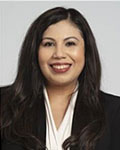
Ana Arenivas, PhD, MPH
Dr. Arenivas joined the section in 2021. She has a central interest in pediatric epilepsy and congenital/genetic conditions associated with seizures. Her primary appointment is in the Epilepsy Center, Neurological Institute where she works as a clinician scientist providing neuropsychological services to pediatric patients and conducting research in cognition in pediatric epilepsy and related genetic conditions. Additional background and interests include assessment with non-English speaking individuals and global research in tuberculous meningitis.

Kayela Arrotta, PhD, ABPP-CN
Dr. Arrotta joined the section in 2019 with an appointment in the Epilepsy Center. Her clinical work primarily involves conducting pre- and post-surgical epilepsy evaluations, although she also sees a small portion of patients within the general adult neuropsychology service. Her current research interests include understanding cognitive deficits across various epilepsy syndromes, evaluating cognitive and quality of life outcomes following epilepsy surgery, and designing and assessing the efficacy of cognitive interventions for patients with epilepsy.
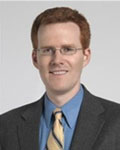
Aaron Bonner-Jackson, PhD, ABPP-CN
Dr. Bonner-Jackson joined the section in 2011, bringing expertise in neuropsychological assessment of dementia syndromes. His primary appointment is in the Center for Brain Health and his research interests include studies of progressive neurological conditions, as well as factors that may reduce risk of cognitive decline and dementia.
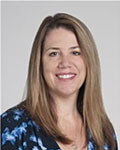
Robyn M. Busch, PhD, ABPP-CN
Dr. Busch joined the section in 2005 and took over as Head of the Section of Neuropsychology in 2020. She has a primary appointment in the Epilepsy Center, Neurological Institute and a secondary appointment in the Genomic Medicine Institute, Lerner Research. Dr. Busch is PI of the Cleveland Clinic Epilepsy Biorepository and Brain Tissue Bank, and her research program seeks to identify factors, including genetic and genomic contributors, that affect neurobehavioral function in patients with epilepsy and to improve prediction of cognitive and behavioral outcomes following epilepsy surgery. The ultimate goal of this work is to develop personalized prognostic models and evidence-based clinical trials to prevent or treat cognitive impairment, improving patient outcomes and quality of life. Dr. Busch also leads several international, multicenter collaborative projects through the International League Against Epilepsy to understand factors associated with cognitive phenotypes in epilepsy and predictors of patient satisfaction following epilepsy surgery.
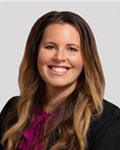
Pamela M. Dean, PhD, ABPP-CN
Dr. Dean joined the Section in 2022 and has an appointment in the Center for General Neurology with a special interest in the evaluation and behavioral management of neurodegenerative disorders and brain tumors. Her research and scholarly interests include both neurologic and rehabilitation populations as well as professional and training-related initiatives. Dr. Dean serves on several national neuropsychology professional organizations including holding leadership roles that focus on education, training, mentorship, supervision, and professional advocacy. She is an elected member on the Board of Directors for the American Board of Clinical Neuropsychology. Additionally, she is proficient in American Sign Language and provides culturally and linguistically appropriate neuropsychological evaluations to prelingually Deaf patients.
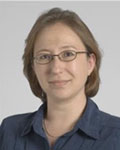
Darlene Floden, PhD, ABPP-CN
Dr. Floden joined the section in 2007. Her primary appointment is in the Center for Neurological Restoration (CNR) where she provides neuropsychological services to adult patients with movement disorders. She has secondary appointments in General Neurology, Cerebrovascular Center, Lou Ruvo Center for Brain Health, and Psychiatry and Psychology. She is a clinician-scientist and her research program is funded by NIH. Research interests include electrophysiological mechanisms of cognition, surgical outcomes in deep brain stimulation and high frequency focused ultrasound, and novel technologies for cognitive assessment.

Rachel Galioto, PhD, ABPP-CN
Dr. Galioto joined the section in 2017 and is appointed in the Mellen Center for Multiple Sclerosis. Her research primarily involves understanding factors associated with cognitive impairment in multiple sclerosis, autoimmune encephalitis, and other neuroinflammatory disorders.

Laura Hancock, PhD, ABPP-CN
Dr. Hancock joined the section in 2023 and has appointments in the Mellen Center for Multiple Sclerosis and the Center for General Neurology. She also serves as the Director of Clinical Training for the Neuropsychology fellowship. Her research interests include cognitive and emotional functioning in people with MS. She has a special interest in older adults with MS and developing a better understanding of how cognitive abilities change among people with MS as they age, and what factors might help us prevent future cognitive decline. She is leading an international workgroup in the development of guidelines to establish consensus with respect to screening and measurement of cognition, and how to define cognitive impairment in MS.
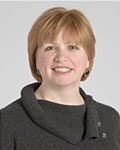
Patricia Klaas, PhD
Dr. Klaas joined the section in 2004 with clinical responsibilities in pediatric neuropsychology. Dr. Klaas' research interests involve memory and cognitive issues in patients with complex medical histories. Areas of interest also include pediatric head injury, congenital cardiac disorders, childhood stroke, and neurodevelopmental disorders. Her current research focuses on cognitive assessment of individuals with PTEN mutations (with Dr. Busch), and cognitive functioning in children with chronic kidney disease.
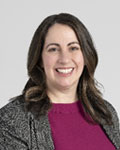
Jessica Meyer, PhD
Dr. Meyer joined the section in 2024 as an adult neuropsychologist with appointments in the Center for General Neurology and the Department of Physical Medicine & Rehabilitation. She provides neuropsychological evaluations through the general neurology service and is leading the development of a neuropsychological rehabilitation program. Dr. Meyer offers both individual and group-based interventions focused on compensatory strategies for cognitive, behavioral, and emotional challenges resulting from neurological injury or illness. Her research interests include examining the neuropsychological effects of head trauma in survivors of intimate partner violence and developing clinical care pathways to support this population.
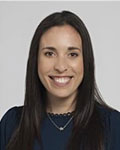
Katherine Reiter, PhD
Dr. Reiter joined the section in 2019 as an adult neuropsychologist with an appointment in the Center for Brain Health (CBH). Her primary clinical interest is memory disorders with additional foci in stroke and traumatic brain injuries. Her research interests include the influence of Cognitive Reserve on age-related cognitive and brain structure changes.
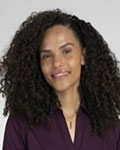
Anny Reyes, PhD
Dr. Reyes joined the section in 2024 and has an appointment in the Epilepsy Center, Neurological Institute. Her clinical interests focus on the neuropsychological evaluation of individuals with epilepsy and brain tumors, cultural neuropsychology, and assessing non-English speaking populations, particularly Spanish speakers. Dr. Reyes's research examines the neuropsychological, behavioral, and psychiatric comorbidities of epilepsy, aiming to enhance cognitive diagnostic frameworks and identify modifiable risk factors and social determinants of health that influence outcomes in epilepsy. She uses community-engaged research approaches to design and implement educational, lifestyle, behavioral, and cognitive interventions aimed at promoting brain health in patients from all backgrounds. In her leadership roles, Dr. Reyes is dedicated to enhancing diversity in neuropsychology and neuroscience through mentorship and recruitment, advancing biomedical research in historically excluded populations, and promoting brain health among underserved communities.
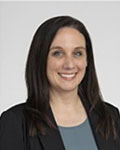
Lindsay Scott, PhD, ABPP-CN
Dr. Scott joined the section in 2024 as an adult neuropsychologist with a primary appointment in the Center for Brain Health (CBH). Her primary clinical interest is differential dementia diagnosis.
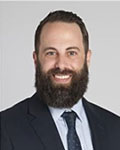
Scott Sperling, PsyD, ABPP-CN
Dr. Sperling joined the section in 2020 and has an appointment in the Center for Neurological Restoration (CNR). He provides services to patients undergoing evaluation for deep brain stimulation and high intensity focused ultrasound lesioning for the treatment of movement disorders, as well as adults and older adults with cognitive and memory complaints. He has a history of funded research and currently conducts studies investigating non-motor symptoms, the relationship between Ch4 degeneration and cognitive decline and neuropsychiatric symptoms, the outcomes of neurosurgical interventions in patients with Parkinson’s disease, and the reliability and validity of tele-neuropsychology. He has expertise in the areas of education, professional development, healthcare policy and program development, and advocacy. He has held many national leadership roles within clinical neuropsychology, the American Psychological Association, and other professional psychology organizations.
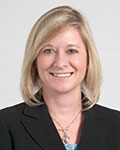
Kelly Wadeson, PhD
Dr. Wadeson joined the section in 2012, adding expertise in rehabilitation. Her primary appointment is in Physical Medicine & Rehabilitation, and she sees patients in Neuropsychology one day per week. Her clinical neuropsychology practice includes school-age children through adults.
Clinical Neuropsychology (Nevada)
Clinical Neuropsychology Postdoctoral Fellowship Program
The Cleveland Clinic Lou Ruvo Center for Brain Health (CCLRCBH) in Las Vegas, Nevada typically offers a two-year fellowship in clinical neuropsychology. At this time, applications for the 2026-2028 training cycle are closed.
For additional questions, please contact Dr. Shehroo Pudumjee at pudumjs@ccf.org.
Living in Cleveland
Cleveland, a vibrant, mid-sized city located on Lake Erie, features a host of cultural attractions, recreational activities, major sporting events, arts, and culinary scene. Cleveland is home to the second largest theater district in the U.S., a park system featuring 23,700 acres in 18 reservations, and is the birthplace of rock ’n’ roll, home to the Rock ‘n’ Roll Hall of Fame and Museum. Cleveland Clinic is located near the University Circle area, which is the cultural epicenter of Cleveland. This area features Severance Hall and the world-renowned Cleveland Orchestra, the Cleveland Museum of Art, several other museums, and Case Western Reserve University. Downtown Cleveland is home to all major sports venues and an exploding culinary scene. All of this is approximately two miles from Cleveland Clinic’s main campus. There is easy access to Lake Erie, an excellent metropolitan park system, and the nearby Cuyahoga Valley National Park for outdoor recreational activities. In the summer, there are water sports on the lakes and rivers including paddle boarding and even surfing (for skilled surfers).
- Learn more About Cleveland.
Some activities and points of interest in the Cleveland area
- Cleveland Orchestra (world-class orchestra performing at Severance Hall)
- Cleveland Metroparks (system of parks and trails encircling Cleveland, known as the “Emerald Necklace”)
- Cleveland Museum of Art
- Holden Arboretum and Botanical Garden
- Metroparks Zoo
- Cuyahoga Valley National Park
- Rock and Roll Hall of Fame
- Playhouse Square (performing arts center hosting theater, comedy, musical, and dance performances)
- West Side Market (large, indoor public market in Ohio City neighborhood)
- East 4th Street
- Cleveland Flats
- Professional sports: Cleveland Browns (football), Cleveland Guardians (baseball), Cleveland Cavaliers (basketball), and Cleveland Monsters (AHL hockey).
- You can also visit thisiscleveland.com or Cleveland Clinic - About Cleveland and review Cleveland Clinic Facts + Figures PDF for more information about activities in and around Cleveland as well as up to date facts and figures about the Cleveland Clinic.
Living in Las Vegas
While many Las Vegas newcomers are awed by the nightlife and world of entertainment options, they are even more delighted with the myriad of housing options available citywide. Whether you are looking for rural seclusion, a lush, private master-planned community or high-rise living on the Las Vegas Strip, you will find the options endless.
Clark County contains Las Vegas, Henderson and North Las Vegas the three biggest cities in Southern Nevada. Clark County's population based on the most recent U.S. Census figures indicates we have reached nearly two million residents. Las Vegas is known as the entertainment capital of the world and over the last couple of decades has garnered accolades for its fast-growing population, entrepreneurial atmosphere, unlimited housing and vast employment options. Las Vegas continues to expand its non-gaming industry base and is becoming a notable education and research community. Henderson has been consistently measured as one of the fastest growing communities in the nation. Las Vegas' little sister, Henderson has a population of just over 250,000.
Just south of Las Vegas, Henderson is a vibrant suburb. Created for Basic Magnesium, Inc. defense plants during World War II, Henderson continues to evolve with the addition of its own entertainment and recreation. Henderson's main attraction is Lake Mead, the world's largest man-made lake and home to Hoover Dam.
North Las Vegas is the third fastest-growing city in the nation with a population exceeding 200,000, and it is vibrant and independent city. A proactive city government has led the way in creating a technology hub in the area. The city is home to the bulk of Southern Nevada's manufacturing facilities.
Located in the southeastern part of the valley, 25 miles from downtown Las Vegas and 10 miles outside of Henderson lies Boulder City, home of the Hoover Dam and Lake Mead National Recreation Area. This small community preserves the charm of "small" town U.S.A. just minutes from the one of the most exciting cities in the world. Controlled growth and thoughtful planning make Boulder City an ideal choice for those seeking a hometown free from gaming.
Planned Communities you might choose the mountain communities located in west and southwest Las Vegas. Mountain's Edge, Summerlin and Centennial Hills are all neighborhood communities that offer amazing vistas and landscapes. Southern Highlands in southwest Las Vegas is one of the newest areas near the airport and the trendy "south" Strip. You might prefer more established communities in the heart of the city near the Strip and resort corridor in Paradise Valley. There are also beautiful communities in Henderson just south of Las Vegas featuring championship golf courses and country clubs such as Green Valley Ranch, MacDonald's Highlands and Seven Hills.